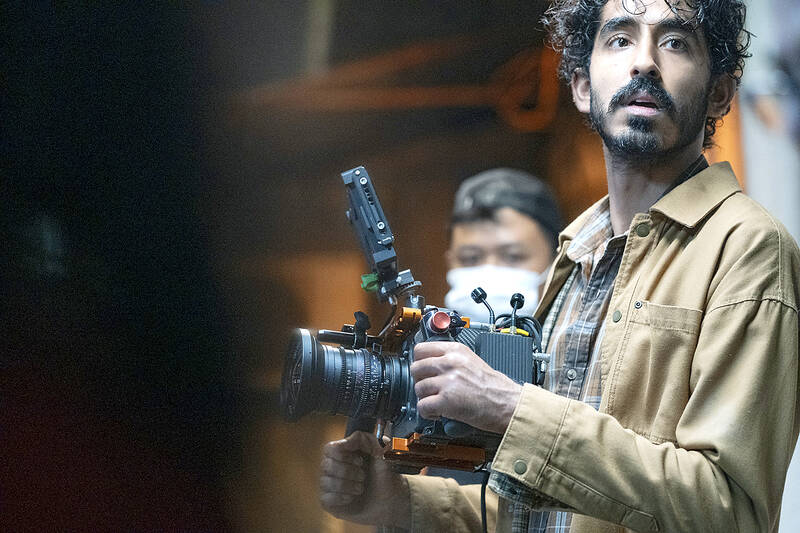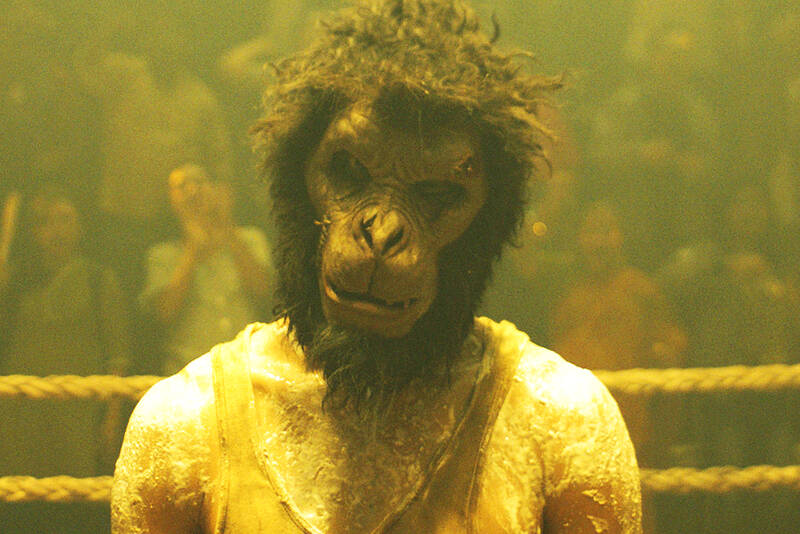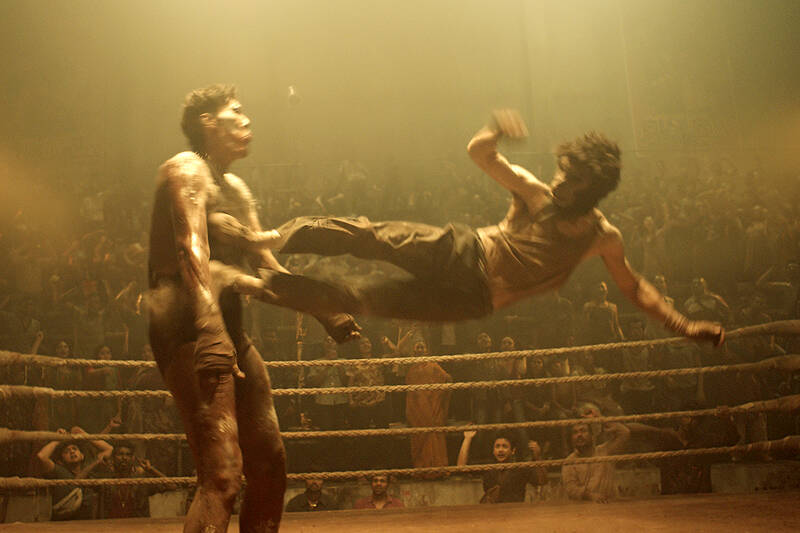With his directorial debut Monkey Man, which he also co-wrote and stars in, Dev Patel (Slumdog Millionaire, Lion) cements himself both as an action star with A-list ambitions and a competent, resourceful B-movie director.
This extravagantly violent and exuberantly messy revenge flick is set in a contemporary India (in a fictional city called Yatana) in which there seems to be a neon-drenched, sleaze-sodden brothel to suit every budget. It’s a place where power and money pollute, and where the poor are not just invisible, they are regarded as being less than human and little more than animals.
With his lithe, snake-hipped grace, Patel wears Keanu Reeves’s John Wick look exceptionally well.

Photo: AP
‘A REVENGE MOVIE WITH A BEAST IN ITS HEART’
Patel takes this idea and runs with it, by incorporating the Indian caste system and class divisions into the story and drawing from the Hindu legend of the monkey-faced demigod Hanuman. When we meet Patel’s unnamed character — he calls himself Bobby, a name plucked at random from a carton of toilet bleach, but is referred to throughout as Kid — he is a scrappy slum-dweller carving out a living, one brutal beating at a time, as an underground bare fist fighter wearing a crude monkey mask.
Patel litters the picture with further bestial imagery: the owner of the fight club is named Tiger (Sharlto Copley); Kid’s opponent in the ring takes his fight persona from a snake. And once Kid has embarked upon his campaign of retribution, he will eventually face up to a man who styles himself “the Lion of India.” This is a revenge movie with a beast in its heart and plenty of bite (literally, on multiple occasions).

Photo: AP
It’s not a wholly original concept: with themes of underdogs, tooth for a tooth and hunter versus hunted, animalistic language has always been woven into the blood-soaked fabric of the revenge movie.
Patel brings a fan’s appreciation of the genre to his film-making and does not attempt to hide his references. John Wick is mentioned by name in an early scene, and there’s a Wick-alike influence in the wardrobe department, with sleek, slim-fitted black suits adding a businesslike efficiency to key action set pieces. With his lithe, snake-hipped grace, it’s a look that Patel wears exceptionally well, so you can understand the temptation to borrow it wholesale from Keanu Reeves.
In the fight sequences, Patel looks to Indonesia for inspiration. His Kid attempts to match both the sympathetic everyman quality and the bloodbath intensity of action phenomenon Iko Uwais, star of The Raid.

Photo: AP
But in the kinetic, camera-as-combatant shooting style, it’s another Uwais movie, Headshot, directed by Indonesian carnage specialists The Mo Brothers, that feels like the closest reference point. We are hurled across kitchens, bathrooms, parking lots and alleyways; the camera somersaults, taking the flinching audience with it on an extended murder frenzy. It’s a visceral, breathless rampage, and while it’s a little rough around the edges at times, the picture’s brawling energy makes it an exhilarating ride.
OFF-KEY STORYTELLING
Not everything works. There are a couple of thuddingly off-key music choices that jolt us out of the story. Kid, scarred by a horrifying childhood trauma that is gradually revealed in fragmented flashbacks, seeks to punish the guilty in the way he knows best. But since the guilty are the unreachable wealthy elite, he must first gain access to a luxury bordello presided over by a formidable, foul-mouthed madam named Queenie Kapoor (Ashwini Kalsekar). Once he has infiltrated the organization (with the help of wisecracking drug dealer Alphonso, played by Pitobash), he has to work his way up to get to the big shots, including the corrupt and sadistic chief of police (Sikandar Kher). And there, among the VIPs and underworld power brokers, he encounters Sita (Sobhita Dhulipala), a sex worker who not only sees him, but recognizes his pain and anger. The poignancy of the moment is rather undermined, however, by the use of a dire remix of Roxanne by the Police on the soundtrack.
Also slightly clunky is Patel’s attempt to counter the more bellicose tendencies of the genre by positioning Kid as a one-size-fits-all champion of disenfranchised outsiders. Our hero may slice off someone’s fingers with a canape tray, but he’s also an ally to the transgender Hijra community after he is taken in and nursed back to health by the women.
The film also refers tangentially to tribal land grabs and slum clearances, and to a simmering Modi-esque culture of division and hostility, but it is all a little too vague to coalesce into actual political commentary.
Ultimately, Patel is clearly more at ease with the action aspect of his directorial debut. And it’s on this level, with its extended periods of axe-based mayhem and some creatively grisly facial injuries, that the film really delivers. Monkey Man doesn’t reinvent the revenge movie wheel exactly, but it does cover it with so much blood that you can barely see where the wheel ends and the pile of knife-perforated henchmen begins.

The Democratic Progressive Party (DPP), Chinese Nationalist Party (KMT), and the country’s other political groups dare not offend religious groups, says Chen Lih-ming (陳立民), founder of the Taiwan Anti-Religion Alliance (台灣反宗教者聯盟). “It’s the same in other democracies, of course, but because political struggles in Taiwan are extraordinarily fierce, you’ll see candidates visiting several temples each day ahead of elections. That adds impetus to religion here,” says the retired college lecturer. In Japan’s most recent election, the Liberal Democratic Party lost many votes because of its ties to the Unification Church (“the Moonies”). Chen contrasts the progress made by anti-religion movements in

Taiwan doesn’t have a lot of railways, but its network has plenty of history. The government-owned entity that last year became the Taiwan Railway Corp (TRC) has been operating trains since 1891. During the 1895-1945 period of Japanese rule, the colonial government made huge investments in rail infrastructure. The northern port city of Keelung was connected to Kaohsiung in the south. New lines appeared in Pingtung, Yilan and the Hualien-Taitung region. Railway enthusiasts exploring Taiwan will find plenty to amuse themselves. Taipei will soon gain its second rail-themed museum. Elsewhere there’s a number of endearing branch lines and rolling-stock collections, some

Last week the State Department made several small changes to its Web information on Taiwan. First, it removed a statement saying that the US “does not support Taiwan independence.” The current statement now reads: “We oppose any unilateral changes to the status quo from either side. We expect cross-strait differences to be resolved by peaceful means, free from coercion, in a manner acceptable to the people on both sides of the Strait.” In 2022 the administration of Joe Biden also removed that verbiage, but after a month of pressure from the People’s Republic of China (PRC), reinstated it. The American

This was not supposed to be an election year. The local media is billing it as the “2025 great recall era” (2025大罷免時代) or the “2025 great recall wave” (2025大罷免潮), with many now just shortening it to “great recall.” As of this writing the number of campaigns that have submitted the requisite one percent of eligible voters signatures in legislative districts is 51 — 35 targeting Chinese Nationalist Party (KMT) caucus lawmakers and 16 targeting Democratic Progressive Party (DPP) lawmakers. The pan-green side has more as they started earlier. Many recall campaigns are billing themselves as “Winter Bluebirds” after the “Bluebird Action”